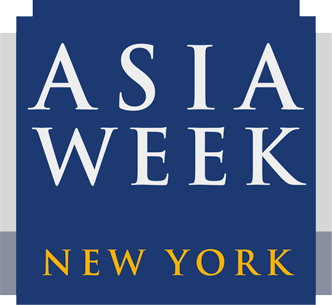The 2015 edition of Asia Week New York ended its nine-day Asian art extravaganza with record-shattering sales totaling $360M, almost doubling last year’s number with an 80% increase of $160M.
Said Carol Conover, chairman of Asia Week New York: “By all accounts, we have succeeded in making New York the destination for buying Asian art, not only for many of the great museums in the United States and abroad, but also for the leading international private collectors. Galleries saw steady and heavy traffic throughout the week, and sales for the four major auction houses reached new highs, making it a great success in terms of revenue in all areas across the board. With the influx of new buyers from China who came here for the sale of The Robert Hatfield Ellsworth Collection at Christies, the exuberance and excitement of the week was palpable.”
New York was ablaze with excitement as the 42 international galleries of Asia Week New York simultaneously opened their doors for the Open-House Weekend on March 14-15. Enhancing the buzz was the magnificent reception at The Metropolitan Museum of Art that kicked-off the whirlwind of activities, with more than 650 collectors, curators and Asian art specialists in attendance. This evening was a prelude to Asia Week’s specially curated exhibitions and packed auctions that were overflowing with international buyers from mainland China, Hong Kong, Taiwan, India, Japan, Korea, England, France, Switzerland and the United States.
Museum curators, many of whom were accompanied by their donors, were seen trekking through galleries and auction houses throughout Asia Week New York representing a multitude of museums. Among them were: The Asian Art Museum in San Francisco, The Rubin Museum of Art, The Metropolitan Museum of Art, The Solomon R. Guggenheim Museum, Brooklyn Museum, Museum of Fine Arts, Boston, China Institute, Asia Society, The Art Institute of Chicago, The Minneapolis Institute of Art, The Portland Museum, The Philadelphia Museum of Art, The Honolulu Academy of Arts, The Norton Museum of Art, The Princeton University Art Museum, The Harvard Museums, Newark Museum, The Samuel P. Harn Museum—University of Florida, Japan Society, The Santa Barbara Museum of Art, The Indianapolis Museum of Art, The Burke Foundation, The Cleveland Museum, The Spencer Museum—University of Kansas, The Smart Museum—University of Chicago, The Nelson Atkins Museum of Art, the Yale University Art Gallery, the Berkeley Art Museum, The MacLean Collection, The Jordan Schnitzer Museum of Art, The Virginia Museum of Fine Art, the John and Mable Ringling Museum of Art, the British Museum and the Shanghai Museum.
Accolades abounded from the international specialists in all the collecting areas who participated in Asia Week New York.
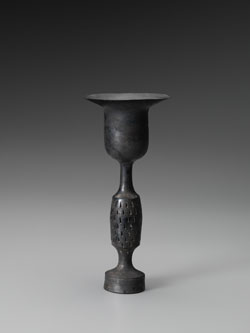 |
Kaikodo LLC
Black "Egg-Shell" Earthenware Goblet Longshan culture Neolithic period 2500–2000 B.C. |
Carol Conover, who in addition to her chairmanship of Asia Week New York, is the managing director of New York’s Kaikodo LLC, “was thrilled to sell to Chinese museums for the first time, as well as to American institutions and private collectors.” Among the works sold were a Longquan Lotus Shaped Celadon Bowl; a Pair of Famille Rose Saucers; a Bamboo Lotus Leaf Form Water Container; Calligraphy by Mei Qing (late 17-18th century); "Moment of Truth The Synergy of Ink,” no. 32, by Wai Pongyu; and a 17th century ink and color hanging scroll, “Death of the Buddha.”
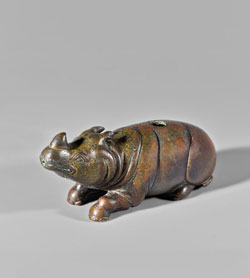 |
J. J. Lally & Co.
An Early Bronze Rhinoceros-Form Waterdropper
Song-Ming Dynasty
10th-16th Century
Length 5 1/8 inches (13 cm)
|
Said James Lally of J.J. Lally & Co, in New York: “Asia Week New York 2015 was the biggest and busiest yet. Sales were strong throughout the week and we saw more new buyers than ever before.” Lally sold four different Ming dynasty bronze incense burners to one collector; a rare Cloisonné Enamelled Scroll-Form Stand sold to an Asian Museum; and a very finely cast Bronze Rhinoceros-Form Waterdropper was acquired by The Metropolitan Museum of Art.
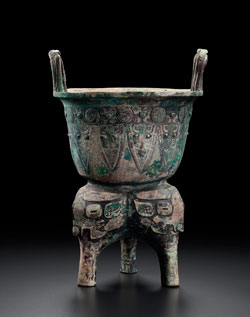 |
Gisèle Croës
Archaic bronze vessel, Xian
Shang dynasty (1600 -1050 BC)
Late Anyang culture (1300-1050 BC)
c. 11th century BC
|
Gisèle Croës, who was here from Belgium, curated a dramatic exhibition at the Gagosian Gallery, where she had a very successful week. “Asia Week was a big success for us,” said Ms. Croës. Among the sales she reported was a rare Archaic bronze vessel, from the Shang dynasty (1600 – 1050 BC).
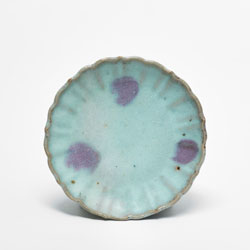 |
Zetterquist Galleries
Splashed Jun-Yao Barbed Small Plate
Jin – Yuan Dynasty 12th-14th c. A.D., China
Diameter: 12.7cm
|
“I was very pleased with the week, and delighted to work directly with so many overseas collectors,” said Eric Zetterquist of his eponymous New York gallery, which specializes in Chinese works of art. Zetterquist reported that his star lot, a Splashed Junyao Barbed Small Plate, from the Jin-Yuan Dynasty, sold early in the week, while Nicholas Grindley, of Nicholas Grindley Works of Art, Ltd, another purveyor of traditional Chinese works of art, reported sales that included a late Ming Huanghuali corner leg table, as well as a large lacquer Ming dynasty circular box and cover depicting a dragon with five claws, dated 1619.
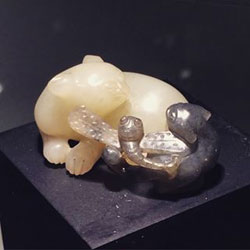 |
Jadestone
An 18th Century black-and-white jade toggle with cats
|
Chinese art specialist Erick Schiess, whose Jadestone Gallery is based in Portland, Oregon, reported a number of very good sales including a painting of Bodhidharma by Wang Zhen, a set of silver-lined Yixing teacups attributed to Chen Mingyuan, and an 18th Century black and white jade toggle with cats, a piece that once belonged to his father many years ago, and that he had only recently re-acquired. It sold it for 30 times its selling price in 1999.
Clare and Michael Chu, principals of the Los Angeles-based Asian Art Studio saw their prized scholars’ desk objects purchased by more mainland China collectors, while their snuff bottles were snapped up by American collectors. “We were very happy to see more interested curators passing through our doors this year,” said Ms. Chu.
Southeast Asian, Indian and Himalayan specialists echoed enthusiasm for this year’s Asia Week New York.
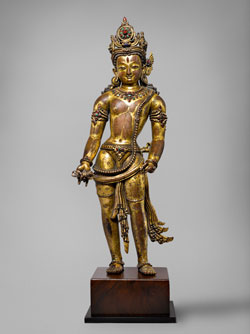 |
Carlton Rochell
Vajrapani
Nepal, circa 1275
Gilt copper alloy inset with semi-precious stones
Height 18 1/8 in. (46 cm.)
|
“We are thrilled with the results of this year’s Asia Week,” said Carlton Rochell of his eponymous New York gallery. “We sold 25 works totaling over $8M.” He reported that American buyers dominated this year with mainland Chinese buyers coming in a close second. The highlight of the week was in the fine group of Himalayan works of art, which included bronze sculpture and paintings from Tibet and Nepal. The top work sold was a sculpture of Vajrapani from Nepal, circa 1275, of gilt copper alloy inset with precious stones. “We were also pleased to present our first stand-alone exhibition of Classical Indian Paintings which drew a very enthusiastic response from museum curators and private collectors internationally,” Rochell said.
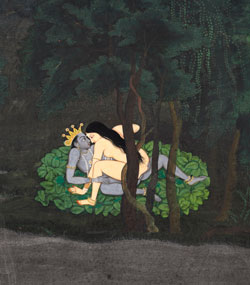 |
Kapoor Galleries
Illustration to a Gita Govinda series painting
|
Suneet Kapoor, principal of Kapoor Galleries in New York, reported increased traffic and interest from past years. “Though the majority of buyers were from the United States and Europe, we met many new collectors, dealers and curators from Asia.” Mr. Kapoor’s sales included a very important Jain marble sculpture, dated to 1028 AD, along with a few of the beautiful Indian Miniatures on display that was purchased by an American collector; The Illustration to a Gita Govinda series of paintings was snapped up by a prominent European collector; a very rare and important Nepalese bronze of Uma-Maheshvara was sold to a distinguished European collection; and a beautiful silvery portrait of Padmasambhava and a very fine gilt-bronze image of Kubera, from the Ming dynasty to went to an important American collection. “We are delighted by the continued interest and support of our clients and visitors and look forward to Asia Week New York 2016!”
Dr. Robert R. Bigler, here from Switzerland, had tremendous feedback from museum curators and private collectors for his exhibition titled Before Yongle-Chinese and Tibeto Chinese Buddhist Metal Images from the 13 and 14th century, the first exhibition of its kind devoted to the subject. “I sold my most important piece to an American collector and museums have expressed interest in several pieces,” said Dr. Bigler.
“We had a very strong and positive response to our exhibition of Indian Painting, 1590-1870,” said Brendan Forge of the London-based Oliver Forge & Brendan Lynch Ltd. Mr. Forge said he met several new private clients and museum curators, and reported that the painting of Emperor Akbar with his grandson, the future Emperor Shah Jahan, from Imperial Mughal, circa 1627-30, sold to a private collector in London, while his catalogue’s cover painting, depicting the King of Afghanistan, was snapped up by an overseas collector. In addition, two important works were reserved by American institutions.
Shawn Gassemi, of the San Francisco-based Art Passages, sold paintings to the Asian Art Museum in San Francisco and to American and Chinese private collectors.
From Kuala Lumpur, Malaysia, first-time participant Shalini Ganendra, of her eponymous gallery, debuted a selection of cutting-edge contemporary Asian art that was met with enthusiasm from collectors and curators alike. “We were pleased to make our debut at Asia Week New York, with a view to developing a strong platform for quality Contemporary Asian Art,” said Ms. Ganendra. “In addition to sales, we met curators from The Museum of Modern Art, The Metropolitan Museum of Art, The Rubin Museum of Art and the International Center of Photography.”
In the Japanese art realm, dealers in ancient and contemporary also reported great enthusiasm with brisk buying among museums and private collectors.
“Old and new collectors alike contributed to a week of unprecedented sales in Japanese ceramics from our Madison Avenue gallery- making it one of the most successful Asia Week exhibitions to date,” said Joan Mirviss, of her namesake gallery. “Not only did our current exhibition Tsubo: The Art of the Vessel, nearly sell out, but the gallery more than doubled these numbers in its additional sales of innovative, concept-driven works by several important young artists. The ethereal ribbon-like sculptures of Kino Satoshi proved wildly popular: museums and private collectors snapped up all six new works within 48 hours.” Ms. Mirviss also reported that a selection of scenic sculptural vessels, by Hoshino Kayoko, with beaded metallic glaze quickly found homes with established collectors, as did Takemura Yuri’s enchanting polychrome tea-bowls — two pieces sold within seconds of each other to individual private collectors, and the twisted and collapsed forms of Yoshimura Toshiharu swiftly sold to first-time clients from both coasts.
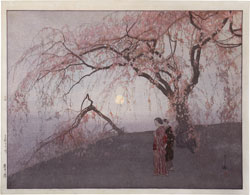 |
Scholten Japanese Art
Kumoi Cherry Trees
ca. 1926
Hiroshi Yoshida
(1876-1950)
Woodblock print
|
Said Katherine Martin of Scholten Japanese Art: “Our exhibition, Kacho Fugetsu: Natural Beauty in Japanese Art, was devoted to the classic Japanese theme of 'the beauties' of nature (flowers, birds, wind and moon). The oversized woodblock print, Kumoi Cherry Trees, ca. 1926, by Hiroshi Yoshida (1876-1950), a breathtakingly beautiful view of two ladies beneath a weeping cherry under the moonlight, was one of our first works to sell, but many print collectors appreciated the opportunity to view in person a very fine impression of one of Yoshida's best and most sought-after prints.” Ms. Martin was also pleased that several paintings sold, including a charming painting of a Playing Cat by Mochizuki Gyokkei (1874-1938), the buyer of which was directly inspired by the popular exhibition, Life of Cats, on view now at the Japan Society Gallery.
Carole Davenport, saw an influx of curators and private collectors who purchased a variety of works of art including the imposingly large scroll created in 1769 the revered artist Maruyama Okyo that shows a pair of dramatic tigers in a landscape setting. “I was very happy to welcome returning clients and meet new ones,” said Ms. Davenport.
# # # #
This year, Asia Week New York welcomed back Aman as their Presenting Sponsor. Aman was founded in 1988 with the vision of building a collection of intimate retreats with the unassuming, warm hospitality of a gracious private residence. The first, Amanpuri (place of peace) in Phuket, Thailand, introduced the concept, and since then, Aman has grown to encompass 26 resorts located in Bhutan, Cambodia, China, France, Greece, Indonesia, India, Japan (Aman Tokyo opening December 22, 2014), Laos, Montenegro, Morocco, the Philippines, Sri Lanka, Thailand, Turkey, the Turks & Caicos Islands, the USA and Vietnam.
Asia Week New York Association, Inc. is a 501(c)6 non-profit trade membership organization registered with the state of New York.
For more information visit www.AsiaWeekNewYork.com
